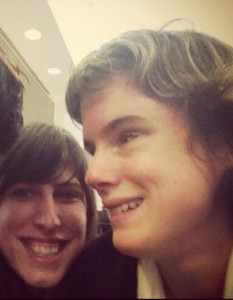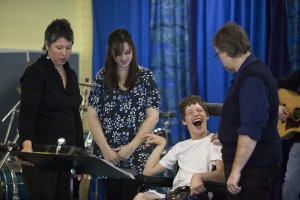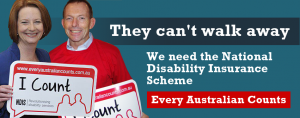Tuesday 7th May 2013
For years now the disability sector has been calling for a more long-term approach to disability support, and the Government seems to have come to the table in recent weeks with the approval and funding of the National Disability Insurance Scheme.
Last week, the Prime Minister announced the scheme would be funded by a 0.5% increase in the Medicare levy, a move which provoked a mixed response. But with Christians forming a large proportion of the disability sector (due to a widespread pro-life stance and concern for the marginalised), it is appropriate to ask, what should be the Christian response to an NDIS?
Eternity invited two Christians to share their perspectives on the NDIS. The first is Lauren Hayes, a Christian with a vision impairment who lives in Melbourne. The second is, Kath McLellan, co-ordinator of “Every Australian Counts”, the campaign which has pushed for the NDIS. She’s a Sydney-based Christian who works for National Disability Services (NDS), Australia’s peak body for disability services not provided by the government.
“Does she want milk and sugar?”: A Christian response to the NDIS – Lauren Hayes 
And so the yearning strong,
with which the soul will long,
shall far outpass the power of human telling;
for none can guess its grace,
till Love create a place
wherein the Holy Spirit makes a dwelling.
We finished singing the closing verse of Come Down Oh Love Divine, and as the organist concluded the service with a rousing instrumental piece, the congregation filed out into the foyer for tea and cake. Putting away my braille copy of the morning’s choir music, which I had to pay for, I joined my fellow choristers in the drinks queue. We arrived at the front of the line, and I asked for a cup of tea. Looking at my friend who was guiding me, the tea lady enquired: “Does she want milk and sugar?”
I groaned inwardly. What I wanted to say was:v“I’ve been coming to this church for a few months now, and you’ve seen me sing in the choir on several occasions. How come you still think I’m incapable of answering a simple question?” Instead, I smiled politely and asked for one sugar, praying that God would help me to forgive her.
How does this relate to the NDIS? There are several ways in which the NDIS, and the discussion surrounding it, relates to my story. Firstly, I was the only member of the choir who had to pay for their music. Not being able to read a printed score, I had my music transcribed into braille. I had a stable job and was able to pay for the transcription service, but with the implementation of the NDIS, I will not have to worry about whether or not I can afford to pay for my music to be brailled. The funding from the scheme will allow me to receive services such as this.
The question which looms though, is will the NDIS see me treated with dignity and respect? Will it mean that people will ask me directly if I want milk and sugar? I’m not sure that it will, even though I’d like to be able to have my milk and sugar and drink it too.
In the same hymn that I included in my opening paragraph, we read these words:
Let holy charity mine outward vesture be,
And lowliness become mine inner clothing;
True lowliness of heart, which takes the humbler part,
And o’er its own shortcomings weeps with loathing.
So what exactly is this “charity” to which the hymn writer is referring? Charity, in its traditional form, is something which my friends with disabilities have become wary of. We cringe when we see advertisements for charity organisations containing sob stories about the poor people with disabilities, who will achieve amazing things if a donation is given.
We’ve lost count of the number of times people have told us we’re inspirational, simply for being able to get out of bed in the morning. Charity is something that is done to us and for us. We often feel that those who give it simply do so because it makes them feel better about themselves, and will earn them greater rewards in heaven.
While charitable organisations may have been established with good intentions, they have often “ended up creating a whole lot of systems like large institutions, special schools and sheltered workshops that were just sitting ducks for the disability rights movement that was to come”. (Barton, S. 2011, Cute Kids and Beauty Queens.)
Little attention has been given to the disability rights movement in mainstream media. It came on the back of other movements such as civil, women’s and indigenous rights movements, and was swallowed up in their wake. I would like to touch on it briefly, as I think it is important when considering how we should respond to the NDIS.
Sick of being used as mascots for fundraising events, and tired of not having their voices heard, people with disabilities, along with able-bodied allies, began fighting the system in the 60’s and 70’s, campaigning for better access to services and the right to be treated equally. A notable example of the disability rights movement in Australia was the protests against the beauty pageants held to raise money for the Spastic Society (now Scope). A key player in the organization of these protests was long-time disability advocate Lesley hall. She speaks about her involvement here.
 Contemporary disability rights activists like Hall have not been the only ones to pave the way for improving the lives of people with disabilities. In 1st Century Israel, a woman who had been bleeding for 12 years came to Jesus for healing (Luke 8:43-47). This is not just a story of a physical healing. This woman had no place to belong and she was determined to take her rightful place in her community. In making her way through the crowds to Jesus, she would have caused people to become “unclean”. To avoid making a scene, she hoped to touch his cloak and slip away quietly. Realising this, Jesus brought her before the crowd so they could hear her story. He didn’t do this to condemn her, but to welcome her back into the community, and to call the people to respond to do the same. They had shunned her for 12 long years, but Jesus lets her touch him, calls her “daughter”, and she finds what she feared she would not receive – healing and acceptance.
Contemporary disability rights activists like Hall have not been the only ones to pave the way for improving the lives of people with disabilities. In 1st Century Israel, a woman who had been bleeding for 12 years came to Jesus for healing (Luke 8:43-47). This is not just a story of a physical healing. This woman had no place to belong and she was determined to take her rightful place in her community. In making her way through the crowds to Jesus, she would have caused people to become “unclean”. To avoid making a scene, she hoped to touch his cloak and slip away quietly. Realising this, Jesus brought her before the crowd so they could hear her story. He didn’t do this to condemn her, but to welcome her back into the community, and to call the people to respond to do the same. They had shunned her for 12 long years, but Jesus lets her touch him, calls her “daughter”, and she finds what she feared she would not receive – healing and acceptance.
We do not know the rest of our friend’s story. We don’t know whether or not her community welcomed her as Jesus did. We do have some insights into how other communities responded to disability and inclusion.
Let’s look at the story of Jesus healing the man born blind in John 9. Prior to receiving his sight, he begged for a living, an occupation that wouldn’t have given him any sense of pride or self-worth. When Jesus’ disciples saw the man, they automatically assumed that sin has caused his blindness, an assumption that many others would also have made. Therefore, it’s quite likely that he wasn’t included in his community. You would think that this might have changed once Jesus healed him. On the contrary, people do not believe his story, and he is carted off to the Pharisees for interrogation. Unsatisfied with his responses, they throw him out of the synagogue. We get the impression that he is worse off than he was before. Jesus welcomes and accepts him, offering him new life and hope, but it seems that no one else got the memo.
2000 years later, and I think we’re still struggling to catch on. We’re uncomfortable with difference and the unknown. We’re reluctant to accommodate difference, as it might mean we have to change the way we do things, or make sacrifices that may stretch us personally or financially. I believe the NDIS is a first step to changing this uncomfortability, but as we have seen recently in the media, it is not going to be the ultimate solution.
I feel as though once again I’ve been reduced to a financial problem, and I’ve been forced to be the political ball in the NDIS tennis match. When (or if) a decision is reached regarding how the NDIS will be funded, and if it is implemented properly, with people with disabilities at the forefront, it will be a vast improvement on our current system. For a person to receive funding for a wheelchair without having to beg for it, or for a person to have a support worker assist them with showering every day instead of three times a week is something not to be sneezed at. But once the people are zipping confidently about town with their new wheels, and they are clean, dressed and ready to go, will this be enough?
As Christians, I believe we should support the NDIS, but it must not stop there. Supporting people with disabilities is more than a financial commitment. We want people to listen to us, stand with us, take the journey with us, so that together as a community, we can love and serve one another as Jesus calls us to do.
Why Christians should support an NDIS – Kath McLellan, Campaign Co-ordinator “Every Australian Counts”
Which country expects someone to live with only two showers a week, expects children to wait more than two years for a wheelchair and abandons young people to life in a nursing home? Australia. A country that prides itself on equality and fair go for all. For Australians living with disability this is far from reality.
In July 2011, following an intensive 18-month investigation of the unmet needs of people with disability and their families and carers across Australia, the Productivity Commission released a damning report. The report found Australia’s disability support system to be inefficient, fragmented, underfunded and unfair. They declared it broken and recommended a drastic change in the way that Australian’s with disability receive support.
So began the fight for a National Disability Insurance Scheme. A no-fault scheme that would empower people with disability and provide them, and their families, with the support and services that they so desperately need.
The fight has been led by Every Australian Counts, a grassroots campaign that has united the disability community. It has seen people with disability, carers, advocates and disability service providers join together and shout with one voice for a better, fairer system.
 Since the campaign’s inception the NDIS has received bi-partisan support, secured launch sites commencing from July 2013 and had legislation unanimously pass through Parliament. This week the NDIS has taken another step toward to becoming a reality with a suggested plan to make it financially viable, a 0.5% increase in the Medicare levy.
Since the campaign’s inception the NDIS has received bi-partisan support, secured launch sites commencing from July 2013 and had legislation unanimously pass through Parliament. This week the NDIS has taken another step toward to becoming a reality with a suggested plan to make it financially viable, a 0.5% increase in the Medicare levy.
While it can be easy to get caught up in the politics and detail of the scheme, it’s what sits at the core of the NDIS that is most exciting. The NDIS will revolutionise the way people with disability and their families are supported in Australia.
For too long too many people with disability have been spectators in their own lives. The NDIS will be a modern, person-centred support system that will allow hundreds of thousands of Australians with disability to have the opportunity to participate actively in their communities by providing targeted supports aligned to need.
The NDIS will mean that Peter, a young man with quadriplegia from Western Australia, can have the personal care he requires to keep his full time job. The NDIS will mean that Heike’s daughter, Billie, can receive the therapies and equipment she needs to have the childhood of any five year old.
The NDIS will allow James, a commerce student at Curtin University, to be independent so that his ageing parents do not have to worry about what will happen to him when they die.
James 2: 14-17 says: “What good is it, my brothers and sisters, if someone claims to have faith but has no deeds? Can such faith save them? Suppose a brother or a sister is without clothes and daily food. 16 If one of you says to them, ‘Go in peace; keep warm and well fed,’ but does nothing about their physical needs, what good is it? In the same way, faith by itself, if it is not accompanied by action, is dead.”
To know the reality that too many people with disability face, but do nothing, is wrong.
Email This Story
Why not send this to a friend?
